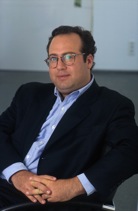Alex Berger
American entrepreneur (born 1962) From Wikipedia, the free encyclopedia
Alex Berger (born March 22, 1962) is a producer, creator, consultant and entrepreneur in the media field.
This biographical article is written like a résumé. (September 2021) |
Alex Berger | |
|---|---|
 Alex Berger in 2000. | |
| Born | March 22, 1962 Philadelphia, Pennsylvania U.S. |
| Occupations |
|
Biography
Summarize
Perspective
Childhood and family
He was born March 22, 1962, in Philadelphia in the US. He is the son of Francine Dreyfus-Berger, a French painter and Dr. Joseph Berger, PhD. In 1972, he moved to France with his parents and his sister Sylvie Berger. After a French schooling, he briefly studied at the University of Pennsylvania, then lived between the US and Europe. He currently lives in Paris, with his wife Florence Servan-Schreiber [fr] and their three children.
Invention of Vizzavi
In 1997, Alex Berger invents the multi-access web portal Vizzavi,[1] which consists of enabling premium content to travel seamlessly between all of the subscribers and their services and devices ( Canal+ pay TV and CanalSatellite pay channels, AOL Europe subscribers, SFR mobile subscribers, Numéricâble subscribers.)... This system named Vizzavi, was co-owned by Vodafone under the name Vodafone Live.[2] service.
CanalNumedia & VivendiNet
In 1998, Berger founded and became the first CEO of CanalNumedia and all the gaming activities of the group (2nd worldwide) and football, cinema and photography sites.[3][4]
In 1999 he founded and became the co-CEO of Vivendi Universal Net (VivendiNet) along with Franck Boulben. VivendiNet regrouped all digital contents of:[5]
Vivendi, Universal & Canal+ merge
Once approved by Jean Marie Messier[6] and Pierre Lescure, Alex Berger initiated the discussions with Universal. With the help of Terry Semel, former CEO of Warner Brothers, they approached Edgar Bronfman Jr, CEO of Seagram, owned by Universal. This strategy led to Vivendi, Universal and Canal+ to merge in June 2000.[7]
After the merger was finalised in June 2000, Alex Berger was at a strategic position between Vivendi-Universal CEO Jean-Marie Messier[8] and Canal+ Group CEO Pierre Lescure, head of content and digital. Internal politics and infighting raging, Alex Berger decided to leave Canal+ group in September 2000.[9]
Berger Report (2019)
On a new organisation for scripted drama series in France
Alex Berger was asked to write a report for the CNC (Centre National du Cinéma et de l’Image Animée- French National Center for Cinema and Animation) on a new organisation of scripted drama in France. The report was commissioned by the CNC to show what and how should be changed in the French market to meet the standards as well as needs in this golden age of scripted drama. The report puts in perspective the changes that need to be made within paradigm shift with the rise of the digital platforms, and how this affects the way of developing, producing and distributing TV series, taking Le Bureau des Légendes/The Bureau as an example.
Television appearance
In 1992, he interpreted the character of Jean-Robert Günther in L'Émission impossible [fr] on TF1, the first show of the TV presenter Arthur on television.[10] In 1994, he made an appearance on Canal+ in the very last sketch of the show in Nulle part ailleurs of Antoine de Caunes and José Garcia. With the humoristic group Les Nuls as a guest on the set, he made a parody of one of them, Dominique Farrugia[11]
Cinema appearance
Alex Berger interpreted the character of Caius Tchounus Mogulus, in Astérix et Obélix: Mission Cléopâtre of Alain Chabat.[12]
References
Further reading
Wikiwand - on
Seamless Wikipedia browsing. On steroids.
